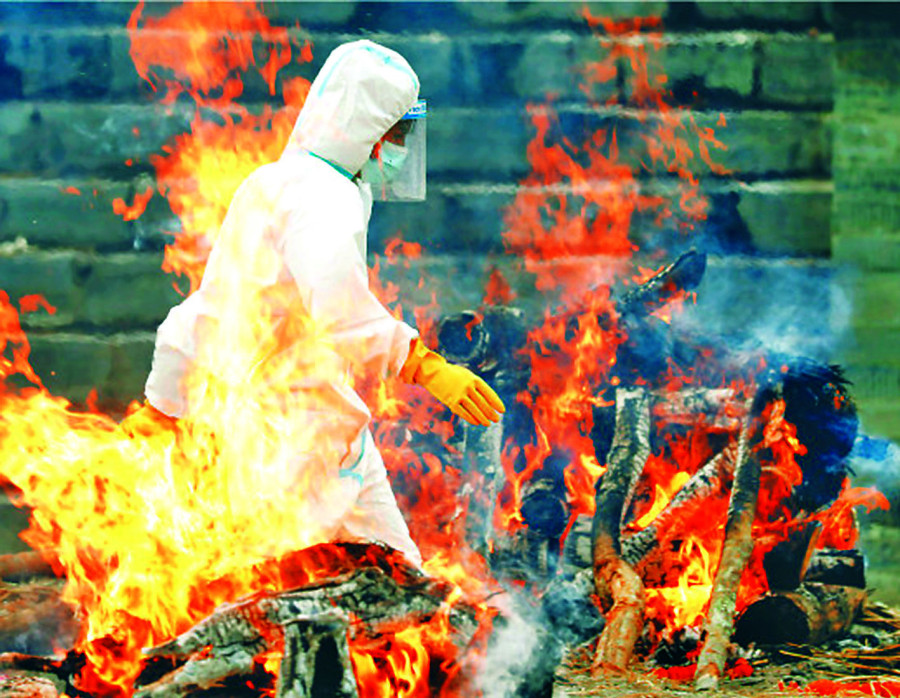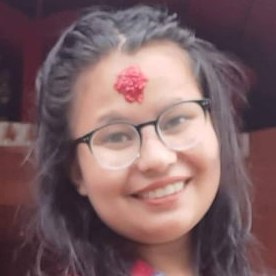National
Management of Covid-19 victims’ bodies a challenge
Authorities in Baitadi and Syangja districts facing obstructions from locals who are against cremating the bodies of Covid-19 victims near their settlements.
Tripti Shahi & Pratiksha Kafle
On Sunday night, a 78-year-old Covid-19-infected man from Gadhi in Dasarathchand Municipality Ward No. 4 died while undergoing treatment at the District Hospital in Baitadi.
His body was cremated three days later, as the local people of Danda Santanesh, nearby settlement, refused to let the body pass through their village on the way to the cremation site.
“The local people did not allow the security personnel from Nepal Army to carry the body through the village. The body remained at the hospital for three days,” said Saraswati Nepali, a women’s rights activist in Dasarathchand.
On Monday, the local residents and the family of the deceased reached the municipal office and the District Administration Office to resolve the issue. The municipal office coordinated with the police and the local administration to dispose of the body on Tuesday.
A team of Nepal Army soldiers used an alternative way to the cremation site and buried the body.
On May 20, a 25-year-old Covid-19-infected man of Melauli Municipality died while undergoing treatment at the District Hospital. The hospital coordinated with the office of Dasarathchand Municipality to cremate the body on the bank of Shera river in the municipality.
However, the local people in the area stopped the funeral attendants from reaching the cremation site, citing that the deceased belonged to another local unit.
The representatives of Dasarathchand Municipality had to request the local people to allow the Nepal Army team to cremate the body on the riverbank at night.
“Only after much persuasion from the local authorities did the residents finally allow cremation. The man from Melauli was cremated on the night of May 21,” said Nepali.
Meanwhile, the local people say they are against the authorities using areas near their settlements as cremation grounds for coronavirus victims because the authorities have not adopted proper measures for body disposal of the victims.
“If a body has to be disposed of, it should be done properly. We see animals gathering at the cremation site searching for feed. The same animals enter our villages. We are afraid there will be an outbreak of other diseases,” said Uttam Chand, a local resident of Ward No. 10 of the Dasarathchand Municipality.
On Thursday, the concerned stakeholders held a meeting of the District Covid-19 Management Committee to find out ways to manage the bodies of Covid-19 victims. Chief District Officer of Baitadi Rajendra Dev Pandey requested the local units to work towards managing dead bodies.
“Some of these incidents have occurred due to a lack of understanding. We are coordinating with the local units to clear out misunderstandings and to assuage people’s fear,” said Pandey.
Dasarathchand Mayor Narendra Singh Thapa said the people’s representatives have been making efforts to coordinate with the local people and help the administration manage the bodies of Covid-19 victims.
So far, 15 individuals have died of Covid-19 in Baitadi since March last year, according to the data of the District Health Office. Currently, there are 491 active Covid-19 cases in the district, the data of the District Health Office showed.
In Syangja of Gandaki Province, the management of Covid-19 victims’ bodies has become more challenging in the last two weeks, according to the District Police.
“Syangja does not have well-managed crematoriums. Most cremation sites are near human settlements and the local people have begun obstructing the security personnel from disposing of bodies in their areas,” said Superintendent of Police Hobindra Bogati.
A 92-year-old man infected with Covid-19 died in his residence at Aandhikhola Rural Municipality-2, Syangja, last week. The villagers stopped his cremation, stating that the burning pyre and the smoke would spread the coronavirus.
Nepal Police personnel, in coordination with the people’s representatives, later buried the body near a community building of a local mothers’ group.
Similarly, a 32-year-old woman of Putalibazar Municipality-10 died of Covid-19 a few days ago. Nepal Army personnel dug a pit on the bank of the Aandhikhola stream at Rangkhola to bury the body. But the local people obstructed the burial, claiming it would lead to the spread of the coronavirus.
Another elderly woman, aged 80, of Arjun Chaupari Rural Municipality-8 died of the virus at the Syangja District Hospital last week. The local people stopped the victim’s relatives from cremating the body near a local stream. The army personnel had to intervene and dispose of the body elsewhere.
“Such incidents have been on the rise in Syangja, which is why we deploy security personnel in large numbers while managing the bodies of Covid-19 victims,” said Bogati. “The bodies buried on the banks of rivers and streams could be washed away by floods, especially since the rainy season is almost here. It is better to cremate the bodies but the local people refuse to let us use the cremation sites for Covid-19 victims.”
The District Hospital in Syangja says the delay in the management of Covid-19 victims’ bodies is causing problems for the hospital.
“The process for body management is lengthy. The hospital has to inform the District Covid-19 Crisis Management Centre about the death of a Covid-19 patient. Then the centre writes to the Nepal Army, urging them to manage the body,” said Dr Ramesh Acharya, chief at the district hospital.
“We have to keep the bodies at the hospital for hours and sometimes days if the local people obstruct cremation,” said Acharya. “The hospital does not have a morgue and we cannot keep the body in the Covid-19 ward with other patients. For now, we are keeping the bodies in a tent pitched just outside the hospital building,” he said.




 9.6°C Kathmandu
9.6°C Kathmandu
.jpg)














